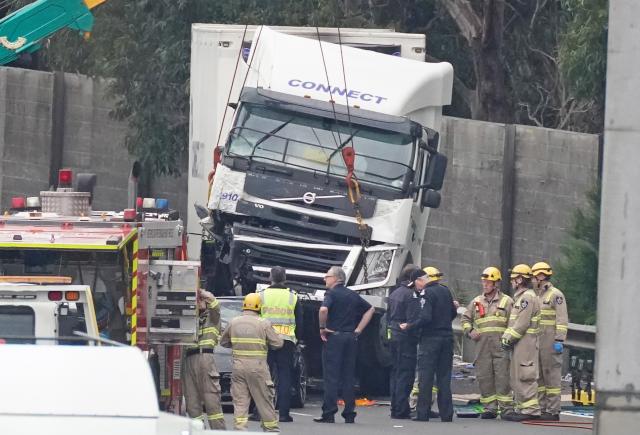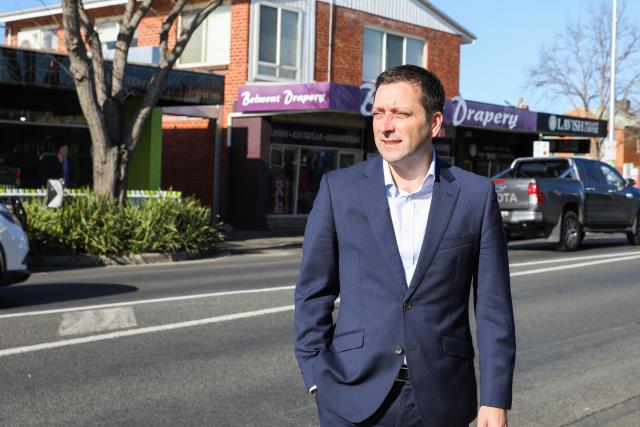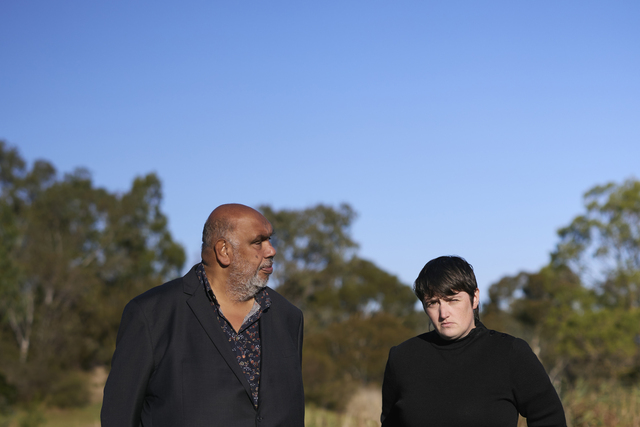A former transport executive has been jailed for up to three years for his reckless workplace behaviour in the lead-up to a crash that killed four police officers.
Cris Large was found guilty of failing to follow health and safety standards while working as national operations manager at Connect Logistics before the Victorian officers were killed in a Melbourne truck smash.
Connect driver Mohinder Singh was fatigued and high on drugs when his semi-trailer ploughed into the four officers, who had stopped a speeding Porsche driven by Richard Pusey on the Eastern Freeway in April 2020.
Large had pleaded not guilty to the charge – the most serious under NSW work health and safety laws – in the third case brought by the National Heavy Vehicle Regulator against Connect executives.
The prosecution sought the maximum punishment of five years in prison for the systemic failures that led to the deaths of Senior Constable Lynette Taylor, Constable Glen Humphris, Senior Constable Kevin King and Constable Josh Prestney.
Magistrate Daniel Reiss on Tuesday ordered Large to serve a non-parole period of 12 months, meaning he will be eligible for release in January 2025.
Prosecutor Jennifer Single SC told Sydney’s Downing Centre Local Court that Large should face the highest possible penalty for his offending given the extent of his wrongful behaviour.
That included completing false timesheets, failing to ensure drivers were managing their fatigue appropriately and systemic failures to ensure safety measures were followed.
“It was so simple to be corrected … the offender simply had to do his job,” Ms Single said.
The heavy-vehicle regulator alleged the truck company, which is no longer operating, risked public safety and contravened its duties by failing to ensure drivers were assessed and monitored for fatigue, drugs and alcohol.
The prosecution argued Large’s encouragement of manager Simiona Tuteru to “get the job done at all costs” was a contributing factor in Singh getting behind the wheel of the truck that later crashed into the four officers.
“By failing to comply with his duties, (Large) engaged in conduct on a number of occasions that repeatedly exposed drivers and later the four police officers to a risk of death and serious injury,” Ms Single said.
Concerns were raised in the lead-up to the crash about the number of hours worked by some of the drivers, including cases of staff working up to 20 hours a day.
The prosecution also successfully sought a prohibition order to stop Large working in the transport sector for 12 months after his release.
Large’s lawyers argued his lack of criminal record and the relatively short period covering his offences – which occurred between December 2019 and April 2020 – were mitigating factors.
But Mr Reiss rejected his claims of remorse, noting the tragic events did not appear to have had much of an impact on the former Connect executive.
He described Large’s actions as “very deceitful and deliberate” with the officers’ deaths the consequence.
Members of the four officers’ families earlier told of their grief in losing their beloved wives, sons and brothers after the hearing moved to a larger courtroom to accommodate those who had travelled from Victoria for the sentence.
Large sat with his head down as Andrew Prestney, the father of 28-year-old Josh Prestney, told the court of the “soul-destroying moment” of finding out his son had been killed.
Large was handcuffed and led from the courtroom after the verdict was read out.
His lawyers indicated he would appeal the sentence.
National Heavy Vehicle Regulator’s director of prosecutions Belinda Hughes said the case showed there was a “shared responsibility for drivers to be fit to drive”.
The duty rests on the company and senior management just as much as the driver,” Ms Hughes said.
“Fatigue isn’t a minor issue; a fatigued driver risks their own lives and the lives of the road users around them.
“Our thoughts are with the families of the four officers. This tragedy serves as a sombre reminder of why we must all work together to uphold the highest standards of road safety.”
NHVR statutory compliance executive director Raymond Hassall said the NHVR challenged companies to “critically review” their fatigue management practices.
“These systems are crucial for ensuring the safety of drivers and the public.”

















